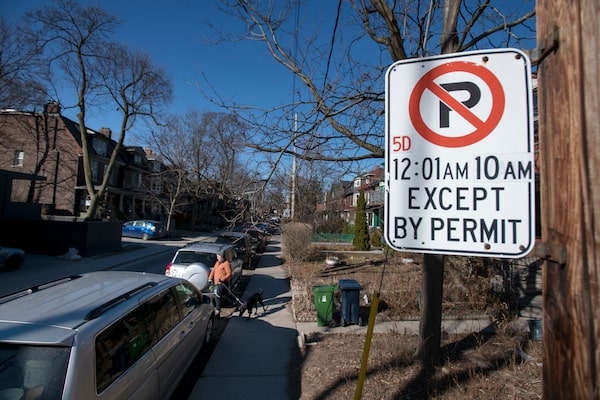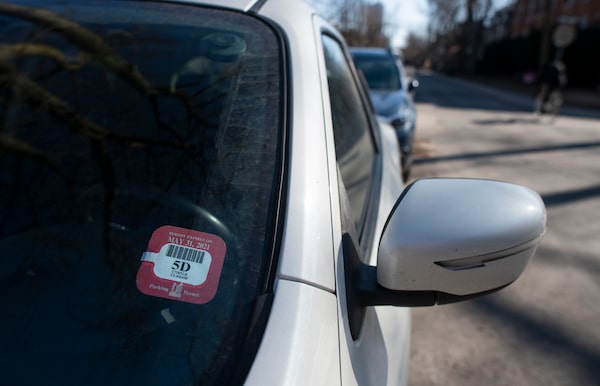
Cars sit parked on Wells Street In Toronto’s Annex neighbourhood on March 15, 2021.Fred Lum/The Globe and Mail
One of the best deals for land in the city of Toronto is the low price paid to park a private car on the public streets in some of Toronto’s most expensive downtown neighbourhoods. But it’s a privilege councillors who represent those communities are increasingly denying to newcomers.
The approvals process for the rezoning of 1327-1339 Queen St. East near Greenwood Avenue in the city’s east end began in 2016, with the builder, Rockport Group, seeking the go-ahead for The George condos, an eight-storey mid-rise condominium with 80 apartments and eight townhouses. During the summer of 2020, local Councillor Paula Fletcher requested a traffic study to understand the impact the development might have on the permit parking in the surrounding residential streets.
On Feb. 2, under the innocuous-sounding motion, “Realignment of Permit Parking Area 8D to exclude the development located at 1327-1339 Queen Street East,” the full council approved a permanent ban on any future resident of George applying for on-street permit parking in the area. The Transportation Services study concluded local parking was 80-per-cent full, with 1,488 permits already issued in the 8D area out of 1,842 possible spaces. “This area does not have a history of being waitlisted, meaning the demand for overnight on-street parking permits has never exceeded the supply of parking spaces,” the report reads.
To developer Jack Winberg, chief executive officer of Rockport Group, the whole thing came out of left field. “It came up as a surprise to us; we didn’t think there’s any reason for it,” Mr. Winberg said. The motion also required that the builder’s marketing materials were to notify potential residents that they would not be able to get permit parking. Mr. Winberg said that condition couldn’t be met for buyers who had already purchased their units years ago. “We’re now getting ready to register our condominium - it’s 90-something per cent sold!” he said of the building, which has 71 parking spots on site for residents, and an additional five spots for visitors. “We had parking for three quarters of our purchasers, so it’s only going to affect a small number of people. But we have heard from a couple who have cars, and would like to park and are upset about this.”
Ms. Fletcher says she’s been applying permit-parking exclusions to rezoning application sites since 2005 (a church conversion on Jones Avenue). In recent years her fellow downtown councillors, such as Gord Perks and Mike Layton, have asked for and received parking exclusions for projects in their wards too. About a half-dozen times a year a new “realignment” is created banning future residents from local streets (there have already been five realignments in 2021).
“Basically, new development should not overwhelm the existing character of the neighbourhood, of the streets that are often at 80 or 90 per cent permit parking from residential, low-rise,” Ms. Fletcher said. “When we’re thinking in a bigger way about introducing a lot of density on a main street like Queen … we’re introducing that density because there’s transit there. There’s spaces the developer has to supply based on planning requirements, so there really should be no reason why anybody would need to park on the street.”
Some frame the issue as one of increasing density putting pressure on the scarce on-street spaces in “stable” downtown single-family home neighbourhoods (where studies have shown population numbers are actually declining.) But it might also be pointed out that on-street permit parking is incredibly cheap.
That annual fee for on-street parking for a homeowner’s first vehicle (if you have no on-site parking) is $201.72, or about 55 cents a night. If it’s your second car, it’s $676.52 a year, or about $1.70 a night. If it’s just for convenience (you have on-site parking available) it’s $881.40 a year, or $2.40 a night. True, drivers don’t get to choose where their spot is with on-street parking; it could be in front of their house (the average price in Toronto-Danforth is $1.4-million) or it could be two streets away, but that chunk of asphalt under the car remains the cheapest land to occupy in the city.
The city of Toronto has about 40,000 permitted spaces and in 2019 the city made $9,847,130 from on-street permits, most at the $201 annual rate. By comparison, the 19,000 spaces run by the Toronto Parking Authorities (TPA) commercial on-street parking program generated $46-million in profits on revenues of $57-million. (TPA is the city’s third-largest revenue earner, number one being property taxes).

A parking permit is displayed on a car's windshield in Toronto on March 15, 2021.Fred Lum/The Globe and Mail
Monthly spot rentals can be had for $200 or more a month. If you prefer to own a private space in a condominium parking garage the prices range between $35,000 and $100,000, according to listings on Realtor.ca. For $35,000 you could keep your car on a city street for 174 years at the current rate for permits.
“What irks me is that a new resident is seen as a second-class citizen with fewer rights,” said George Popper, an architect who specializes in infill development and has seen previous projects of his excluded from on-street parking.
“We’ve reached a saturation point for permit parking,” Ms. Fletcher argues. She said she is encouraging more car-sharing by allowing those programs to access permit parking spaces and is pushing for more bike-lanes and transit service.
Your house is your most valuable asset. We have a weekly Real Estate newsletter to help you stay on top of news on the housing market, mortgages, the latest closings and more. Sign up today.
 Shane Dingman
Shane Dingman